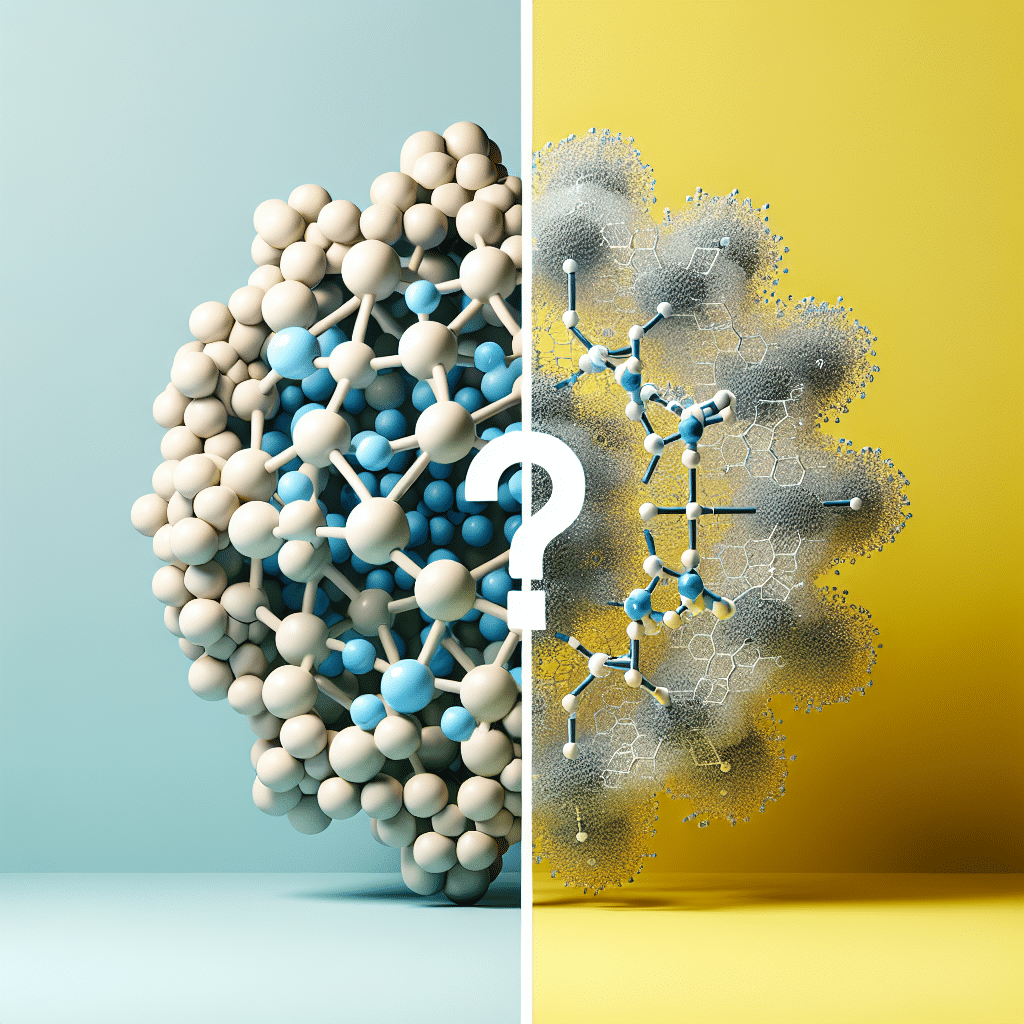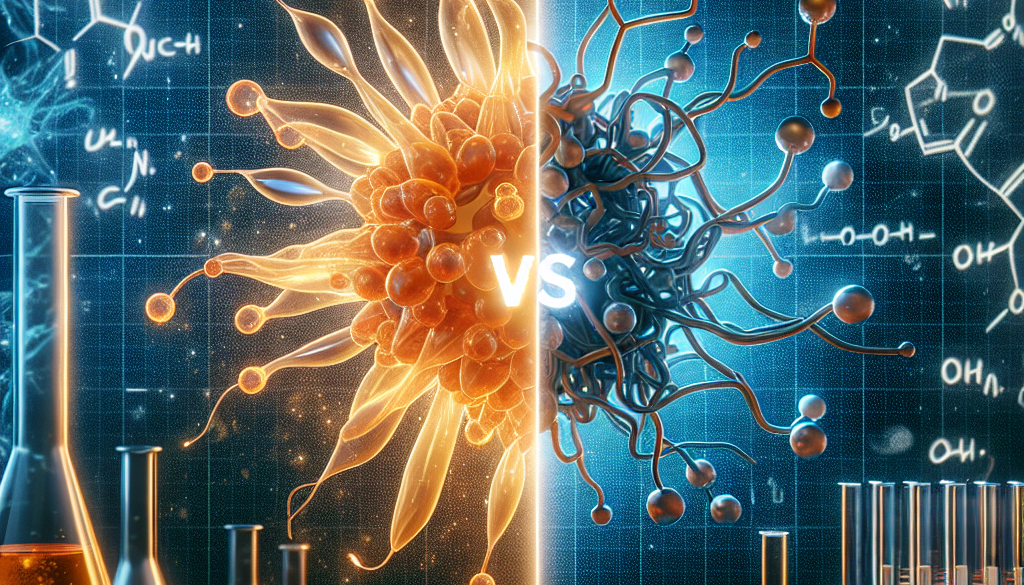Liposomal Glutathione vs NAC: Which Is Better?
-
Table of Contents
- Liposomal Glutathione vs NAC: Comparing Antioxidant Supplementation
- Understanding Glutathione and NAC
- What is Glutathione?
- What is NAC?
- Liposomal Glutathione: Enhanced Absorption and Bioavailability
- Benefits of Liposomal Glutathione
- NAC: A Versatile Precursor to Glutathione
- Benefits of NAC
- Comparing Efficacy: Liposomal Glutathione vs NAC
- Liposomal Glutathione for Direct Antioxidant Support
- NAC for Glutathione Synthesis and Detoxification
- Scientific Research and Case Studies
- Research on Liposomal Glutathione
- Research on NAC
- Side Effects and Considerations
- Liposomal Glutathione Side Effects
- NAC Side Effects
- Conclusion: Which Is Better?
- Explore ETchem’s Protein Products
Liposomal Glutathione vs NAC: Comparing Antioxidant Supplementation

Antioxidants play a crucial role in maintaining health by combating oxidative stress and protecting cells from damage. Among the most discussed antioxidants are glutathione and N-acetylcysteine (NAC). Both have been touted for their health benefits, but they differ in their composition, absorption, and mechanisms of action. This article delves into the comparison between liposomal glutathione and NAC, exploring which might be the better option for supplementation.
Understanding Glutathione and NAC
Before comparing liposomal glutathione and NAC, it’s essential to understand what each substance is and its role in the body.
What is Glutathione?
Glutathione is a tripeptide composed of three amino acids: cysteine, glutamate, and glycine. It is naturally produced by the body and is present in every cell. Glutathione is a powerful antioxidant that helps neutralize free radicals, supports the immune system, and plays a role in detoxification processes.
What is NAC?
N-acetylcysteine (NAC) is a derivative of the amino acid L-cysteine and is a precursor to glutathione. NAC has its own antioxidant properties and is often used as a dietary supplement to boost glutathione levels in the body. It is also used as a medication to treat acetaminophen (Tylenol) poisoning and to loosen thick mucus in individuals with cystic fibrosis or chronic obstructive pulmonary disease.
Liposomal Glutathione: Enhanced Absorption and Bioavailability
Liposomal glutathione is a form of glutathione encapsulated within liposomes—tiny spherical structures made from cholesterol and phospholipids. This encapsulation allows for enhanced absorption and bioavailability, as it protects the glutathione from being broken down in the digestive tract.
Benefits of Liposomal Glutathione
- Improved absorption and protection from digestive enzymes
- Direct delivery to cells due to its lipophilic nature
- Potential to raise intracellular glutathione levels more effectively than non-liposomal forms
NAC: A Versatile Precursor to Glutathione
NAC is not only a source of cysteine for glutathione synthesis but also has antioxidant properties of its own. It is more stable than glutathione when taken orally and can be an effective way to increase glutathione levels in the body.
Benefits of NAC
- Acts as a mucolytic agent, breaking down mucus in the respiratory system
- Has been shown to have neuroprotective and psychiatric benefits
- Can replenish glutathione levels in cases of overdose or poisoning
Comparing Efficacy: Liposomal Glutathione vs NAC
When it comes to efficacy, both liposomal glutathione and NAC have their merits. The choice between the two often depends on the specific health goals and needs of an individual.
Liposomal Glutathione for Direct Antioxidant Support
Liposomal glutathione is thought to be more effective for direct antioxidant support due to its enhanced absorption. It may be particularly beneficial for individuals with conditions that require a direct increase in cellular glutathione levels.
NAC for Glutathione Synthesis and Detoxification
NAC is effective in conditions where glutathione synthesis needs to be supported, such as in cases of acetaminophen overdose. It also has additional benefits due to its mucolytic and neuroprotective properties.
Scientific Research and Case Studies
Several studies and case studies have been conducted to evaluate the effectiveness of liposomal glutathione and NAC.
Research on Liposomal Glutathione
Research suggests that liposomal glutathione may improve markers of oxidative stress and immune function. A study published in the European Journal of Clinical Nutrition found that liposomal glutathione supplementation led to significant increases in body stores of glutathione.
Research on NAC
NAC has been extensively studied for its role in treating acetaminophen toxicity and chronic respiratory conditions. Its effectiveness in raising glutathione levels has been demonstrated in numerous clinical trials.
Side Effects and Considerations
Both liposomal glutathione and NAC are generally considered safe when taken as directed. However, they can have side effects and may interact with certain medications.
Liposomal Glutathione Side Effects
- May cause abdominal cramps and bloating
- Possible allergic reactions to phospholipids in liposomes
NAC Side Effects
- Can cause gastrointestinal discomfort, nausea, and vomiting
- Potential for allergic reactions in some individuals
Conclusion: Which Is Better?
Deciding whether liposomal glutathione or NAC is better depends on individual health needs and goals. Liposomal glutathione may offer more direct antioxidant benefits, while NAC is versatile and supports glutathione synthesis. Consulting with a healthcare provider can help determine the most appropriate choice for supplementation.
Explore ETchem’s Protein Products
For those interested in enhancing their health regimen, ETchem’s protein products offer high-quality options. With a range of collagen products sourced from various origins, ETchem caters to diverse dietary and health needs. Their commitment to quality and customer satisfaction makes them a top choice for protein supplementation.
About ETChem:
ETChem, a reputable Chinese Collagen factory manufacturer and supplier, is renowned for producing, stocking, exporting, and delivering the highest quality collagens. They include marine collagen, fish collagen, bovine collagen, chicken collagen, type I collagen, type II collagen and type III collagen etc. Their offerings, characterized by a neutral taste, instant solubility attributes, cater to a diverse range of industries. They serve nutraceutical, pharmaceutical, cosmeceutical, veterinary, as well as food and beverage finished product distributors, traders, and manufacturers across Europe, USA, Canada, Australia, Thailand, Japan, Korea, Brazil, and Chile, among others.
ETChem specialization includes exporting and delivering tailor-made collagen powder and finished collagen nutritional supplements. Their extensive product range covers sectors like Food and Beverage, Sports Nutrition, Weight Management, Dietary Supplements, Health and Wellness Products, ensuring comprehensive solutions to meet all your protein needs.
As a trusted company by leading global food and beverage brands and Fortune 500 companies, ETChem reinforces China’s reputation in the global arena. For more information or to sample their products, please contact them and email karen(at)et-chem.com today.




